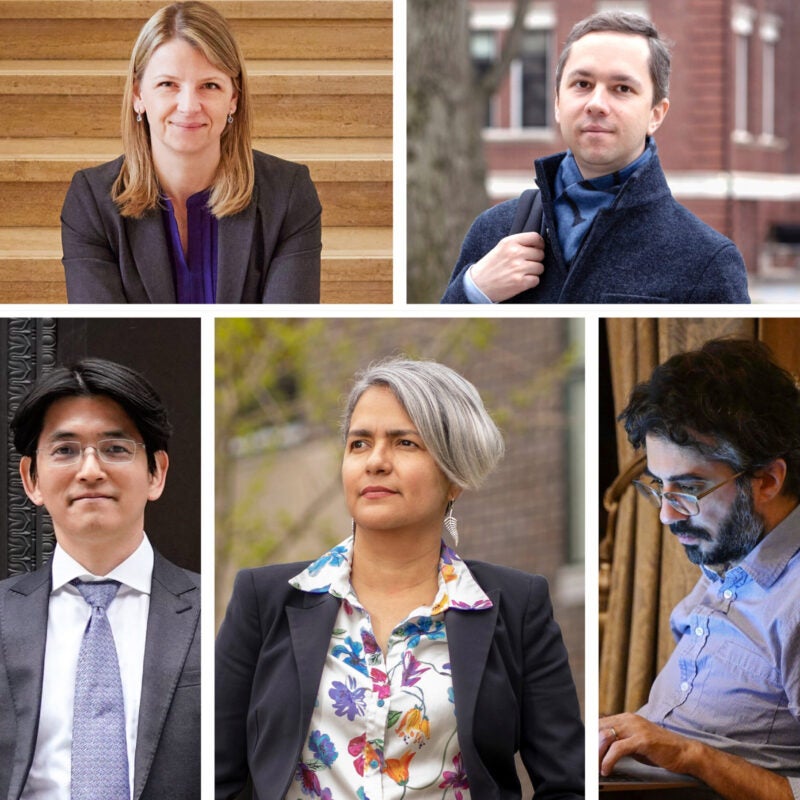It would be difficult to assemble a student body with a wider breadth of backgrounds and lived experience than that of the Harvard Law School LL.M. program, which this year celebrates its 100th anniversary. The centennial Class of 2024 includes 180 students representing 69 countries and jurisdictions, from Argentina to Zimbabwe.
But even with so much variety among them, the program’s participants over the years have shared certain key qualities, according to alumni.
“Open-mindedness,” says Geneviève Chabot LL.M. ’11, a special legal counsel for the Supreme Court of Canada, who has also served as a trial judge in Belize. “These are students open to the world and open to other ideas, open for their ideas to be challenged and fleshed out and discussed and put to the test.”
“A thirst for comparative knowledge,” says Zaid Al-Ali LL.M. ’01, an expert in constitution-building based in Tunisia. “They’re all trying to learn from their U.S. professors, their U.S. peers, and their foreign peers as well, with a view to deepening their own knowledge and understanding of their own systems of law and how they can be improved.”
“Everyone had an incredible story,” says Grigory Vaypan LL.M. ’13, a Russian human rights lawyer, “success stories, or stories of overcoming challenges because they all [are] people of determination — Harvard people of determination. That’s what distinguishes them.”
As Harvard Law celebrates a century of the LL.M. program, the Bulletin takes a look at the varied careers of five graduates from the past 25 years.
Zaid Al-Ali LL.M. ’01, Tunisia
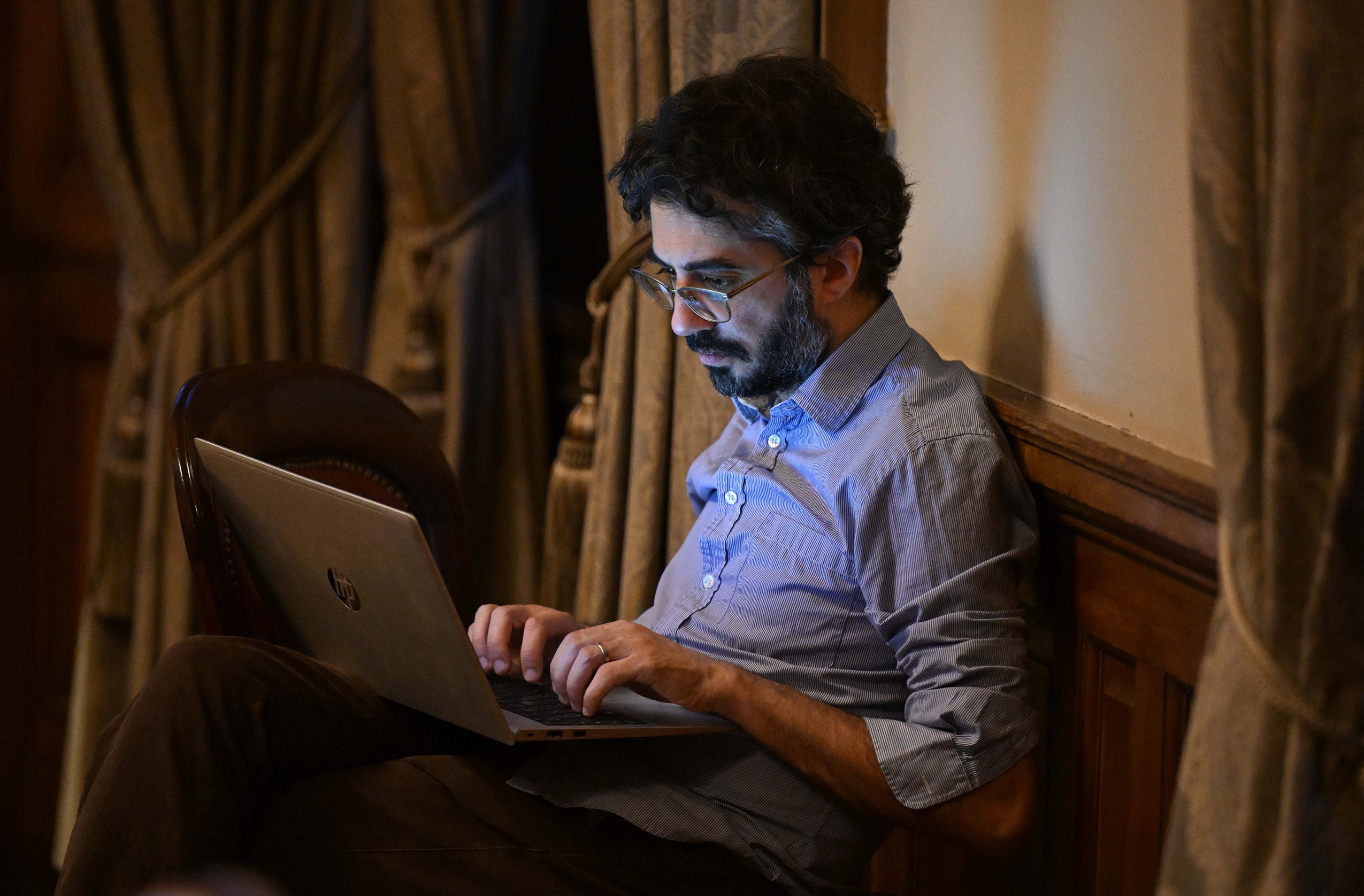
‘I had to go to Iraq and try to be involved in the effort to try to rebuild our country’
Born in exile to Iraqi parents, Zaid Al-Ali LL.M. ’01 wants people around the world to have the opportunity to thrive in their home countries so they aren’t forced by circumstances to leave.
“The real tragedy is when people feel compelled to emigrate, despite the fact they don’t want to, because of conflict, poverty, misgovernance, corruption,” and other factors, says Al-Ali, who is based in Tunisia with the International Institute for Democracy and Electoral Assistance.
As senior programme manager working on drafting constitutions in the Africa and West Asia region, Al-Ali helps Arab countries improve their governance and create stable, peaceful societies. He has implemented projects and provided support to reform initiatives in Iraq, Egypt, Libya, Yemen, Sudan, and other nations. He also led the establishment of the Arab Association of Constitutional Law, the region’s first network of constitutional experts.
These days, due to the ongoing conflicts in North Africa and the Middle East, he increasingly spends his time advising governments on negotiation strategies and drafting peace agreements.
Educated in the law in London and Paris, he was working in international commercial arbitration when the U.S. invaded Iraq in 2003.
Given his family ties, says Al-Ali, a citizen of the U.K. and Iraq, “it was obvious to me that I had to go to Iraq and try to be involved in the effort to try to rebuild our country and help put things back together. As a legal adviser to the U.N. in Iraq, he worked with the Iraqi Constitutional Committee on the politically fraught process of drafting and implementing a new permanent constitution.
The results in Iraq were far from what he and others had hoped for. But he developed expertise in the highly specialized field, and in 2007 he led a team of lawyers advising the government of Bosnia and Herzegovina on its new constitution. When the Arab Spring erupted in 2010-11, he joined International IDEA “to try to help other countries not repeat the mistakes that were made in Iraq,” he says. And when Libya, Syria, and Yemen, and other nations, devolved into full-blown conflict, he offered to help negotiate settlements and draft peace agreements.
Al-Ali matriculated at Harvard Law to broaden his perspective on the law, particularly on its economic underpinnings. He found his fellow students “exceptional” and remains very close with not only LL.M.s but J.D. students he met, saying he compares legal problems he’s grappling with to what they’re encountering in Latin America, in Asia, and throughout Africa. And he carries with him every day — and shares with his colleagues — advice he got from Joseph H.H. Weiler, then a professor at HLS, that while it’s important to understand economics and politics, “ultimately, we are lawyers,” and it’s legal advice that clients rely on.
Harvard’s LL.M. program is worth celebrating, Al-Ali says, because of its contributions to comparative law and the students’ life experiences. “It’s made it much more possible for people like me and many, many others to interact with people from different jurisdictions and different legal backgrounds all over the world, to enrich our own understanding of the problems we’re dealing with and the sorts of solutions that can be brought to these problems,” he says. The ultimate goal, according to Al-Ali, should be improving people’s lives, whether it’s in relatively prosperous places or less advantaged ones, like the countries where he has worked.
Geneviève Chabot LL.M. ’11, Canada
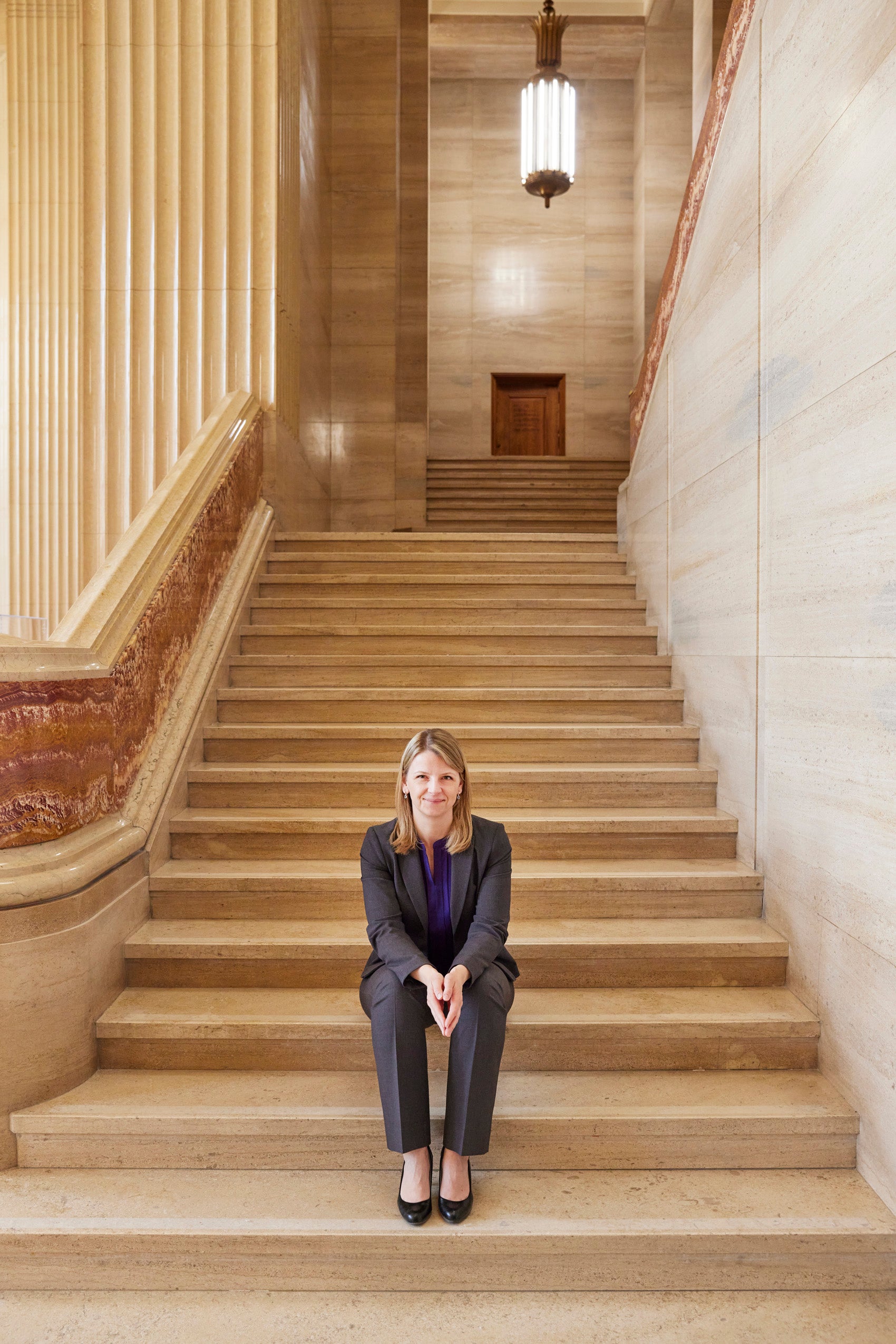
On the bench in Belize, the Canadian lawyer put into practice what she learned at Harvard Law
From her earliest days as a law student at the University of Ottawa, Geneviève Chabot LL.M. ’11 wanted to become a judge. Still, she never imagined that her first stint on the bench would be not in Canada but 3,500 miles away, on the High Court of Belize.
“It was a stroke of luck, just a wonderful thing that happened to me,” says Chabot, who from 2022 to 2024 presided over civil cases in Belize before returning this February to Ottawa.
After earning an LL.M. at Harvard Law, Chabot worked in civil litigation and human rights roles in the Yukon. In late 2021, she was completing a four-year term as deputy chief commissioner at the Canadian Human Rights Commission, where she assessed complaints of discrimination and harassment. On the lookout for opportunities that would support her interest in becoming a judge, she came upon an unusual new project in Belize.
Due to the COVID-19 pandemic and other factors, the Belize judicial system was struggling with a large backlog of cases. The Commonwealth Secretariat, an association that promotes the rule of law among its 56 member nations, was recruiting lawyers from outside Belize to sit as judges for a short period. In January 2022, Chabot departed frigid Ottawa for the tropical climes of Belize City. There, she and three other lawyers — from Canada, New Zealand, and Jamaica — served as judges (half of them on the civil side and the other half on the criminal) and heard appeals from magistrate courts.
Her training at Harvard Law, where she’d focused on comparative constitutional law and public law, proved invaluable. “When I arrived in Belize, I noticed that the body of jurisprudence is quite small,” in large part because the country has only around 400,000 people, she recalls, but “I had a lot of very important public law decisions to make, and some of them had constitutional implications.” To help her interpret the Belizean Constitution, she analyzed the constitutions of South Africa, Australia, England, and Canada. “I had to put into practice what I learned at Harvard and, from a practical level, make decisions based on comparing similar provisions in different constitutions around the world,” she says.
The LL.M. program “contributes to increasing the level of exchange between nations,” she says. “What I really enjoyed was having those discussions around coffee or drinks about law in other countries, the different approaches in different countries, and how those approaches can influence your job in your own country and the law in your own country.”
Upon returning to Ottawa in early 2024, she assumed another newly created role: She is one of three special legal counsel at the Supreme Court of Canada, where she provides legal advice to the justices on complex issues and helps write decisions. And, eager to reconnect with classmates and meet other alumni, she plans to be back in Cambridge for the 100th anniversary celebration of the LL.M. program in the fall of 2024.
Karla Quintana-Osuna LL.M. ’08, Mexico
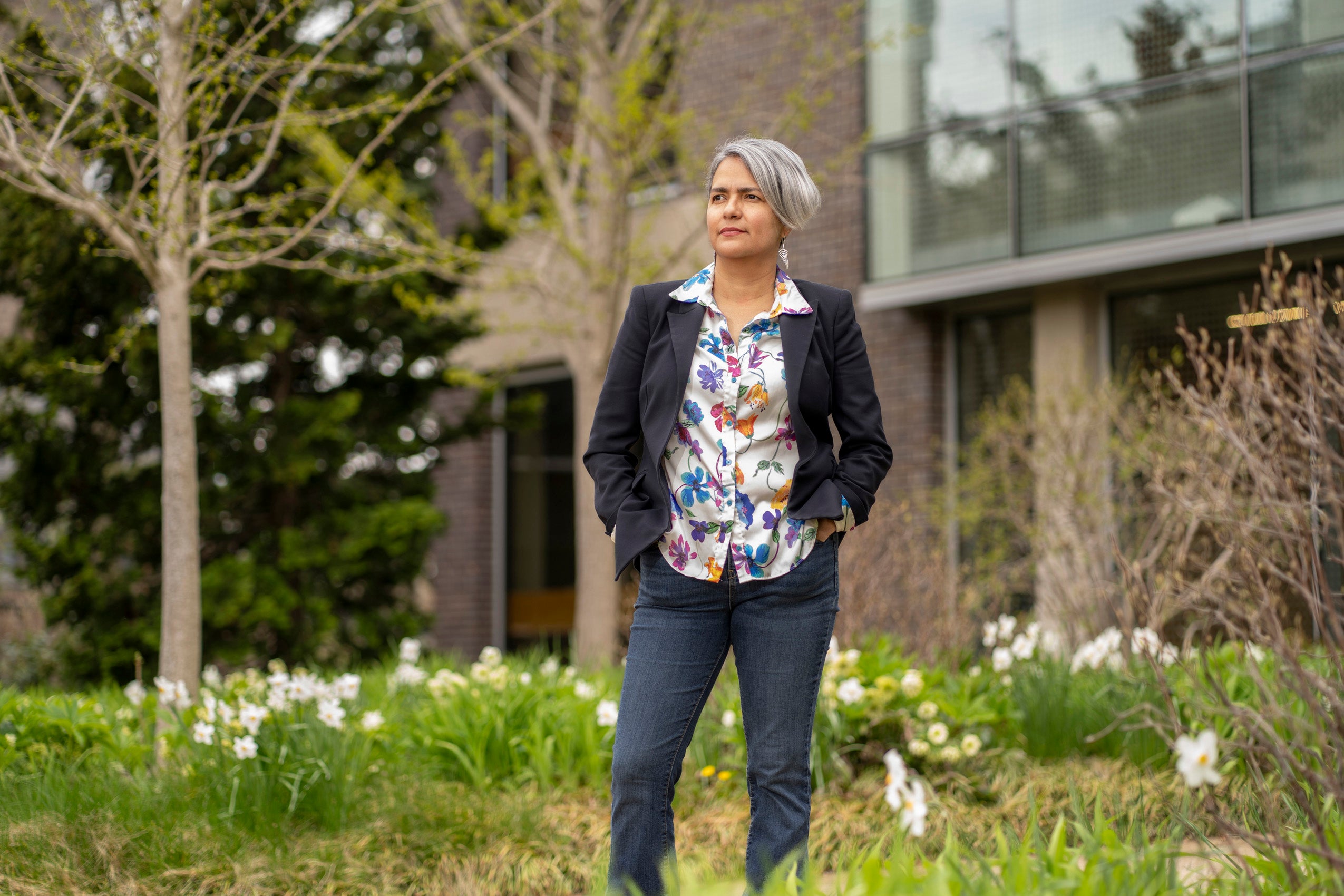
Searching for the disappeared: ‘You never accomplish what you hope to, especially when you are talking about human rights violations’
More than 309,000 people have gone missing in Mexico since 1952 — victims of drug cartel violence, government-sanctioned disappearances, human trafficking, domestic violence, or causes unknown. Until very recently, they were unaccounted for. But in 2018, the Mexican government created the National Search Commission to address the disappearances and placed human rights expert Karla Quintana-Osuna LL.M. ’08 at the helm.
From 2019 to 2023, Quintana — who has an extensive background in human rights work, including as a former litigator before the Inter-American Court of Human Rights — served on the National Commission for the Search of Missing Persons. Working with many local and state agencies, the organization has located over 62% of the missing, most of them alive.
But another 115,000 remain unaccounted for, including in the infamous case of 43 students from a rural teachers college who disappeared in 2014. As of today, only small amounts of the remains of three of them have been found. It’s unclear how they died or where the other missing students are.
But because of Quintana’s team, it is now known that more than 4,000 clandestine graves have been found in Mexico since 2007. After building the commission from the ground up (it had no telephones, computers, or internet access when she arrived), she led her team to create a systemized and public registry of the missing that is fed by multiple institutions around the country, and she brought together a group of multidisciplinary experts to analyze the context and patterns of disappearances. “We not only have to understand who we’re looking for,” she explains, “but why and where they are being disappeared.”
In 2021, she and then-Undersecretary for Human Rights Alejandro Encinas persuaded President López Obrador to allow the U.N. Committee on Enforced Disappearances to visit Mexico. The committee determined that those responsible for disappearances are almost never brought to justice. Working with the families of the disappeared and the U.N. committee, Quintana and her team successfully lobbied for the creation of the national Center for Human Identification. “That was a very important step, politically speaking and in terms of the scope of what the commission is able to do,” she says.
The work is often very dangerous. “What happens when there are criminal groups in certain areas where you have to go search for the disappeared? You have to bring in special security forces, you have to bring the Army, you have to bring the Marines, you have to bring the local or state police, you have to coordinate all that in order for you to have a better chance to find someone alive,” she says. Despite the danger, the hope of finding answers for the families of the disappeared, she says, “gives you more impulse to do the job.”
Quintana resigned in 2023 over a disagreement with the government on how to tally the number of disappearances. Working with El Colegio de México and the Ford Foundation, she’s now writing a book about her work building the commission and, more broadly, about what she calls the “disappearance, forensic, and justice crisis” around the work.
Was she able to accomplish what she’d hoped? “You never accomplish what you hope to, especially when you are talking about human rights violations,” Quintana says. “I think we were able to start building an institution, to start building possible answers” from a public policy perspective. Still, she notes, “if you ask this question to family members, they’ll probably tell you no. As long as you don’t find their loved one, they will normally say no,” a response she says is understandable.
As a student at Harvard, one of the most important lessons she learned was from Professor David Kennedy ’80, an expert in international law. “He was very, very critical of human rights work,” she recalls. She came to realize that “he was trying to make human rights defenders see things from outside their very small group, and that’s very helpful. We knew we had to build better answers to our arguments.”
Grigory Vaypan LL.M. ’13, Russia/U.S.
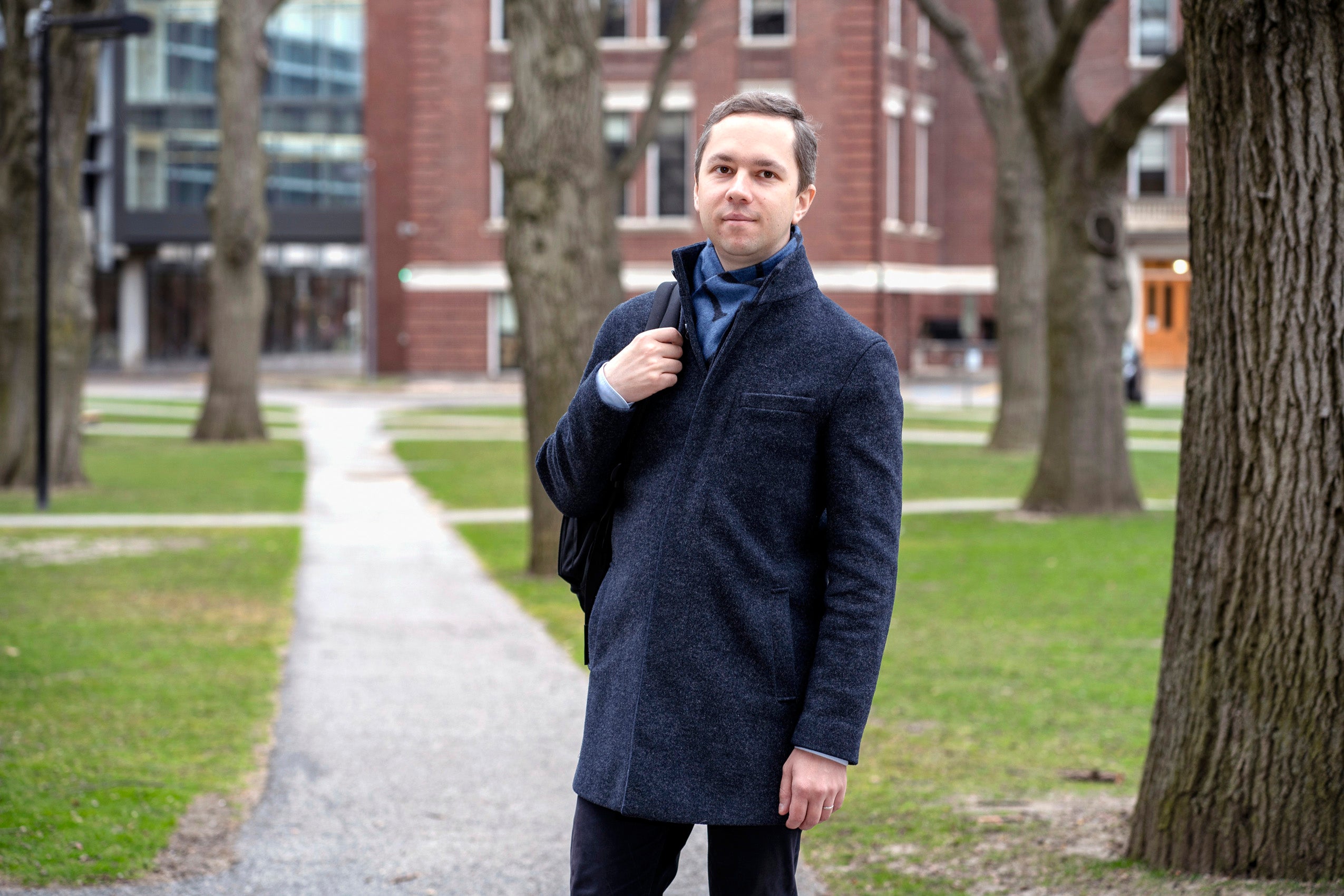
‘Making sure that Russia is a rule of law country is for me an essential part of being a Russian citizen’
The death of Russian opposition leader Aleksei Navalny in February 2024 came as a blow to many, including Grigory Vaypan LL.M. ’13, a Russian human rights lawyer who has devoted his career to trying to strengthen democracy and the rule of law in his home country.
“It’s a very tragic moment, one of the worst days for Russia in the entire post-Soviet 30 years,” says Vaypan, who spoke to the Bulletin about a week after Navalny died in a Russian prison. His generation, Vaypan says, grew up with Navalny as “one of the thought leaders and moral leaders who inspired us all so much, myself included, to do things for the benefit of the Russian society.” And Navalny, a lawyer, “was one of the people who inspired me to do public interest lawyering,” Vaypan adds.
As a law student at Moscow State University, Vaypan witnessed what he says was massive fraud while acting as an election observer. He recounted being kicked out of a polling station by two police officers and losing a court case challenging the election results. “Making sure that Russia is a rule of law country is for me an essential part of being a Russian citizen.”
Vaypan and his now-wife, Aleksandra Ivlieva LL.M. ’13, were admitted to the LL.M. program together. It was “a transformative year for me,” he says. “It really inspired me to go back to my country to do public interest lawyering.” He was “exposed to the history of U.S. social justice movements, U.S. strategic impact litigation — things we don’t really have so much of at home,” he says. And he interacted with students with experience in volunteering and clinical programs. “This really opened my eyes to the role lawyers can play in society.”
He especially loved Langdell Hall, “a place of reflection for me,” he says, where he was able to prepare himself to “go out and change the world.”
After graduating, Vaypan worked at a Moscow NGO, the Institute for Law and Public Policy, helping to launch a strategic litigation program to try to persuade the Russian courts to uphold democratic norms. In 2020, he joined Memorial, Russia’s oldest human rights group, where he and others sought redress for victims of human rights abuses in the Soviet era and today. But in 2021, the government forced the dissolution of Memorial in Russia. He ended up leaving his home and eventually working remotely from D.C. for Memorial in exile, part of “a loose network of people scattered around the globe yet still a team.”
Vaypan says that he, Memorial colleagues, and many others will be advocating for more information about the circumstances of Navalny’s death. He hopes that Russian civil society and people around the world will join them in demanding an independent international investigation.
“It’s important to me because it’s my country,” says Vaypan. “I am a member of the first post-Soviet generation. We were the first generation born in a country that had just freed itself from totalitarianism.”
But he and his colleagues came to realize, he says, “that the oppressive system has never gone away.” We need to do something, he adds, to make sure Russia is free, democratic, and a good neighbor to nearby countries and to the rest of the world.
In March, Vaypan, who also holds a Ph.D. in international law from St. Petersburg State University, returned to Harvard Law as part of the Visiting Researcher Program, where he is focusing on transitional justice for Russia post-Vladimir Putin. “It’s futurology,” he says, with a smile.
Kazuhiro Yanagida LL.M. ’03, Japan
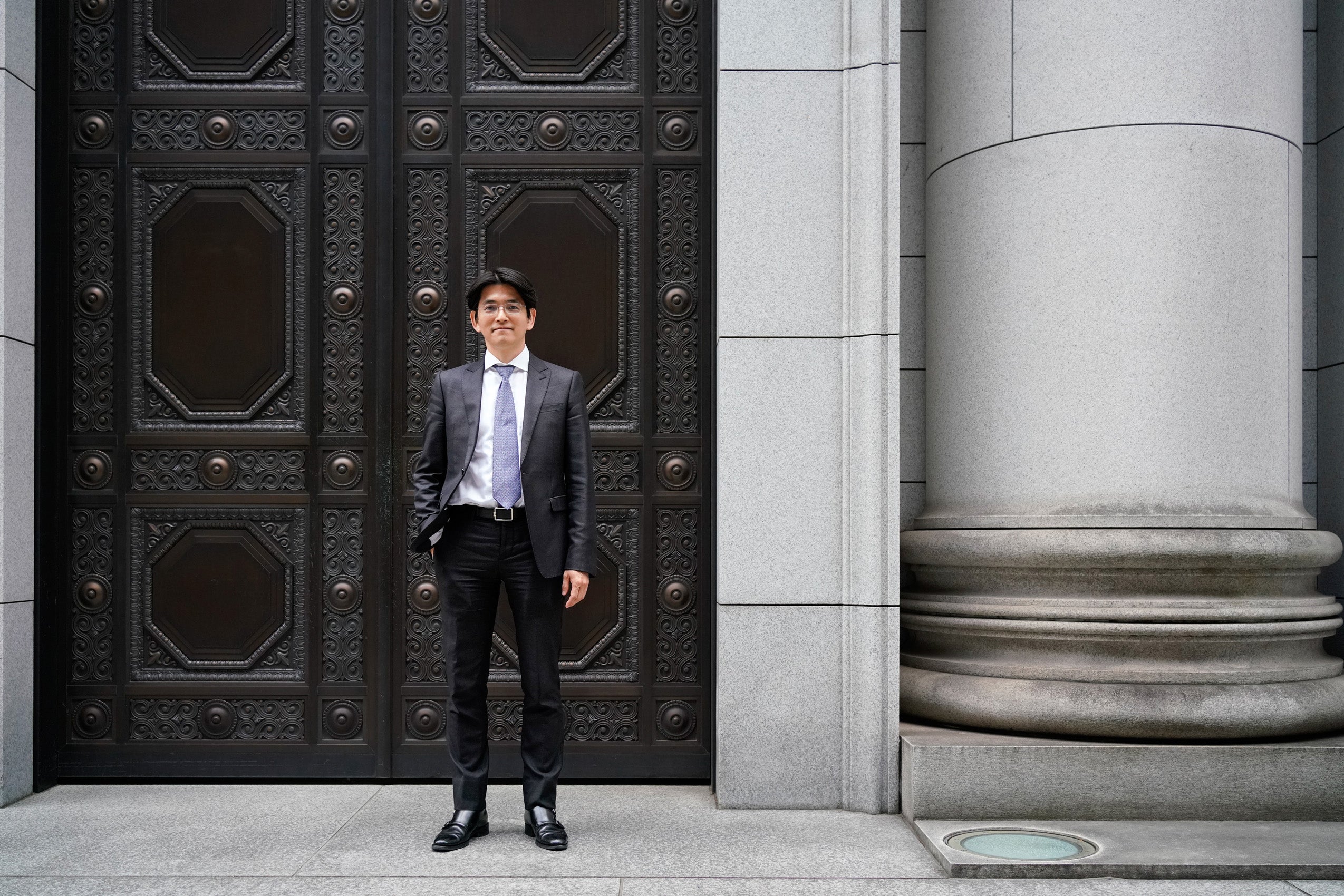
Harvard Law strengthens the ability to challenge existing systems
Kazuhiro Yanagida LL.M. ’03 was a practicing lawyer in Tokyo with one Master of Laws degree from Waseda University in Tokyo already under his belt when he entered the LL.M. program at Harvard, eager to study the intersection between international civil litigation and dispute resolution.
Having already spent a year at Harvard Law as a visiting scholar in the East Asian Legal Studies Program, Yanagida had made friends with two J.D. students, with whom he roomed during the LL.M. program. His education, he recalls, came from them and his LL.M. cohort as well as from formal lessons.
“One of the unique qualities of HLS is that the school has a diverse and talented body of students, and they learn from each other by communicating both in and outside of classes,” says Yanagida.
Yanagida felt fully absorbed into the Harvard Law community, in large part due to his roommates, Thomas E. Kellogg ’03, who today is executive director of the Center for Asian Law at Georgetown Law, and Joshua Bloodworth ’03, a deputy general counsel at the New York City Department of Housing Preservation and Development.
“They are very outgoing,” says Yanagida. “They introduced a lot of their friends to me,” he recalls, showed him around Cambridge, took him on ski trips. Yanagida remains in touch with them, and they have on occasion worked together, he adds, another benefit of being an LL.M. program graduate.
Yanagida, who is managing partner at Yanagida and Partners in Tokyo, focuses on bankruptcy and the resolution of international disputes. He says bankruptcy law is a field that combines a number of his interests, from helping nonperforming companies get on their feet, to out-of-court workouts, to bankruptcy litigation, to mergers and acquisitions. He has also worked for the International Monetary Fund and the World Bank in that area, and he occasionally moderates an IMF program in Singapore for lawyers and lawmakers from around Asia, helping to develop best practices for efficient systems of insolvency, especially in developing countries.
Yanagida’s father is Yukio Yanagida LL.M. ’66, and based on the model he experienced while studying in Cambridge, he was deeply influential in reshaping legal education in Japan. Among other things, the new system puts more emphasis on practical training, which the younger Yanagida says is a positive development.
A member of the HLS Leadership Council of Asia and secretary of the Harvard Law School Association of Japan, he says the most important skill he learned in the LL.M. program was critical thinking, which burnished his ability to challenge existing systems in order to improve them. And, he adds, “Harvard is always changing, trying to be a better educational institution,” and that inspires him to do the same in his career. “It’s always important to adjust yourself or adjust the system to the world, which keeps changing.”
